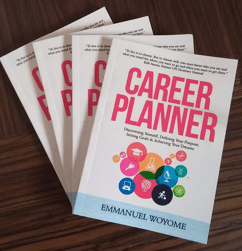“Work is the most important activity for a successful career on earth.”
It is often said that “If you fail to plan, you plan to fail.” Even with a plan, navigating through life can be a hazy experience. Without a plan, things are likely to get even more complicated. That is why I find the matter of career planning truly relevant for career growth and development. My friend, Emmanuel Woyome, who is a career coach, has provided guidance on this in his book Career Planner.
Career Planner – the book by Emmanuel Woyome
In the book, he starts off with a compelling introduction. Emmanuel Woyome refers to work as “the most important activity for a successful life on earth.” He states further, “It is through work that we are able to meet our needs and wants as individuals and develop our nations.” He goes on to stipulate the importance of career planning. He is convinced that “not everybody is right for every work, every work is not right for everybody.” The difference maker is “how you do it and how committed you are.” Planning your career helps you to optimize the opportunities therein. He also talks about the fact that everyone is important, so is every work.


The book is segmented into five chapters under the following headings: Understanding who you are, Understanding the world of work, Understanding the world of education, Defining your global career purpose, Developing your 20-year career plan, Your 20-year career plan template, and finally Discipline and action for success.
Emmanuel headlines Chapter One with a remark by former United Nations Secretary-General Kofi Annan, “To live is to choose. But to choose well, you must know who you are and what you stand for, where you want to go and when you want to get there.” The thrust of this chapter is that, “everyone has both strengths and weaknesses.” We must use the knowledge of our strengths and weaknesses as the basis for what we do or do not do.
Mr. Woyome advises readers to seek to identify their values, interests, skills and talents, and passion. For each of these pillars, he digs deep and offers important signposts that help to identify them.
In the second chapter, where the author gives an overview of the world of work, he stresses that “Knowing your strengths and weaknesses is not enough.” He leverages the Holland Code to show how we can harness use our strengths and abilities to carve a meaningful career path. The Holland Code is a career personality framework developed by American psychologist and sociologist John Holland. The code categorizes careers into Realistic, Investigative, Artistic, Social, Enterprising, and Conventional (RIASEC) classes. These elements give useful information about work tasks, preferences, abilities, occupations, and overall occupational profile.
Emmanuel then focuses on education in Chapter Three. His emphasis is that people must focus their educational pursuits on areas that will prepare them to concretize their identified values, abilities, and interests. He advocates the need for all to research deeply before committing themselves to an educational path. He also devotes a substantial chunk of the chapter to discuss different levels, forms, and fields of education available.
The fourth chapter is about how to define your global career purpose. He stresses, “Activities… and life without purpose are meaningless,” “Purpose gives you direction in life,” “Purpose gives you focus to invest your resources,” and “Without purpose, you abuse your life,” For me, the high point of this chapter is how he establishes a linkage between career paths and global challenges, making a case for us to seek to use our careers to address some of the most debilitating problems of our world. He brings in the United Nations’ Sustainable Development Goals (SDGs) and indicates that we may link our career goals to the SDGs.
The next two chapter are about developing a 20-year career plan. Using Benjamin Franklin’s Personal Productivity Pyramid, Emmanuel walks the reader through steps and provides resources for developing a long-term career plan. The template he provides is useful.
The last chapter makes a case for discipline and action as strategic pillars for actualizing the high points of a person’s career plan. The quote by Jim Rohn at the beginning of the chapter sums it all up, “Discipline is the bridge between goals and accomplishment.”
If you come across this book, do well to obtain a copy. I highly and unreservedly recommend it as a useful resource for building a meaningful and successful career. It’s an easy read very concise (112 pages long).
—
About the author
Terry Mante is a business development and management consultant who has worked on market research, strategy, corporate training, capacity-building, branding, as well as PR and communications projects for clients in diverse fields. He is an incisive and inspiring author, personal development coach, moderator of focus group discussions and conference/workshop resource person.
To book or network with Terry, connect through Facebook, Twitter or Instagram (@terrymante or tmexchange1); LinkedIn (Terry Mante); Email: [email protected] and WhatsApp: +233.249.827.575










